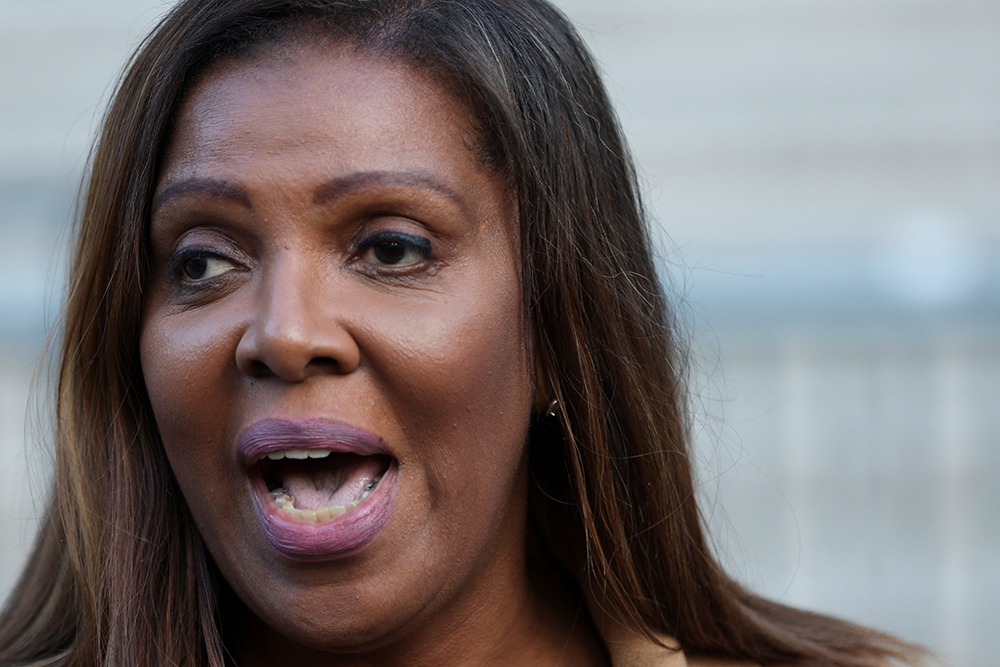
WASHINGTON — A federal judge has granted a preliminary injunction requested by New York Attorney General Letitia James to create a buffer zone for protesters at New York abortion clinics in several counties.
Judge Kenneth Karas of the U.S. District Court for the Southern District of New York also reduced the buffer distance from the 30 feet James had requested to 15 feet and said it had to apply to even more New York counties.
The restriction stems from a lawsuit filed by James this summer, that is still ongoing, against Red Rose Rescue, a Michigan-based group that has been conducting blockades of abortion clinics in New York, Michigan, and Virginia for the past six years.
The lawsuit said the group’s members had invaded clinics, threatened staff members, and terrorized patients. A month after filing the lawsuit, the attorney general’s office filed a motion for a preliminary injunction to stop the group from blocking access to abortion clinics while the case proceeded.
The federal judge’s Dec. 8 order subjected Red Rose Rescue to a 15-foot buffer zone around all clinics within the jurisdictions of the Southern District of New York and the Eastern District of New York.
“This important decision will protect reproductive health care providers and the patients they serve from Red Rose Rescue’s hateful, militant tactics while our lawsuit proceeds,” James said in a statement.
“Red Rose Rescue has made it clear that they intend to continue obstructing access to abortion care, but we will not allow them to harass New Yorkers with their bigotry,” she added.
Judge Karas said the attorney general’s office had shown irreparable harm and a likelihood of success on the merits in the ongoing lawsuit. He also determined that a buffer zone was in the public interest and would not infringe on the defendants’ First Amendment rights.
The preliminary injunction applies to the individual defendants in the lawsuit and all affiliates of Red Rose Rescue and covers abortion clinics in the counties of New York, Bronx, Westchester, Rockland, Putnam, Orange, Dutchess, Sullivan, Kings, Nassau, Queens, Richmond, and Suffolk.
Red Rose Rescue is led by Catholic women Monica Miller and Suzanne Abdalla. On the group’s website, Miller said the lawsuit against the group is for “activity that simply doesn’t exist. First of all, Red Rose Rescue is not an extremist group, no more extremist than those fighting for civil rights in the 1960s.”
She also said the group’s members do not “invade abortion centers,” but “simply, quietly walk in as any other person might walk into an open doctor’s office.
“They are there to show love and give hope to these women, giving them a final chance to choose life,” Miller said.
Robert Muise, an attorney with the American Freedom Law Center representing Red Rose Rescue, called the lawsuit against the group “nothing more than a tool of intimidation” and said James was “weaponizing her office to attack and vilify peaceful pro-lifers to discourage them from engaging in activity that is constitutionally protected.”
In other action regarding buffer zones for protestors at abortion clinics, the Supreme Court Dec. 11 declined to hear a case that would have restricted these zones.
A group of 14 states, legal experts, sidewalk pro-life counselors, and pregnancy centers had urged the high court to take up the case of Debra Vitagliano, a Catholic challenging a law in Westchester County, New York, that prohibits her sidewalk ministry outside abortion clinics.
Vitagliano, represented by Becket, a religious liberty law firm, asked the court to reconsider its decision from 2000 in Hill v. Colorado, which allowed states and local governments to ban counseling, education, or handing out literature within 8 feet of the entrances of those facilities.
The court’s brief order declining to hear this dispute had no noted dissents. It lets stand the precedent set in Hill v. Colorado
Vitagliano’s case focused on her ministry at abortion clinics that ended last year when Westchester passed the Reproductive Health Care Facilities Access Act that established a 100-foot zone around abortion clinics — including public sidewalks — preventing anyone from approaching within 8 feet of another person in that zone unless given explicit consent.
Westchester County’s law, which imposes misdemeanor penalties of up to $5,000 and a year in jail for those who attempt to counsel women outside abortion clinics, is similar to a Colorado law upheld by the Supreme Court in Hill v. Colorado, which many have criticized as going against the country’s free speech protections.
When Vitagliano filed suit against the county law, her case was dismissed by a New York District Court based on the precedent set by the Hill ruling. Her case was similarly dismissed by the Second Circuit Court of Appeals for the same reason.
When it was submitted to the Supreme Court, Mark Rienzi, president and CEO at Becket, said: “Governments should not try to outlaw peaceful conversations on public sidewalks, and they certainly shouldn’t make it harder for women to get complete information.”
